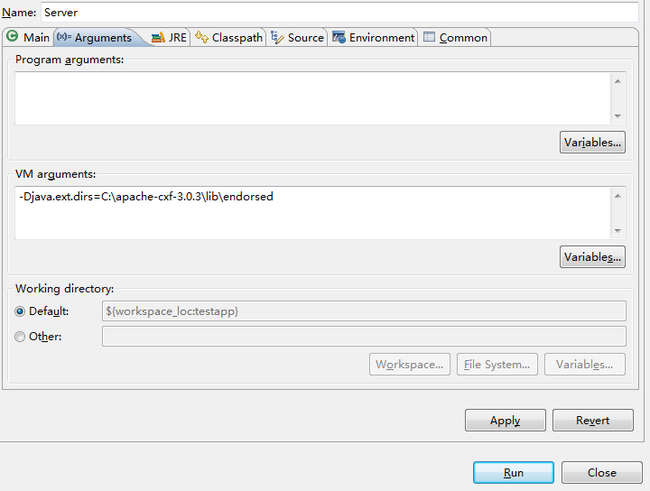使用cxf构建webservice
一、简介
cxf是apache下的一个开源的,功能齐全的WebService框架。是由Celtix和XFire两个开源框架组合而成。cxf可以帮助我们使用前端编程模型构建和开发服务,如JAX- WS和JAZ-RS。这些服务可以使用不同的协议,如SOAP,XML/HTTP,RESTFul HTTP或者CORBA和使用各种的数据传输协议,如HTTP,JMS 和JBI。除此之外cxf还有如下特性:
- 使用简单,可与maven,spring等进行集成。
- 支持Web Service标准,包括soap,WS-I Basic Profile, WSDL, WS-Addressing, WS-Policy, WS-ReliableMessaging, WS-Security, WS-SecurityPolicy, WS-
- SecureConverstation, 和WS-Trust (partial)。
- 对二进制和遗留协议的支持,cxf设计并提供了一个可插拔的架构,不仅支持xml还支持非xml类型的绑定,如json,corba。可使用多种类型格式进行传输。
- 提供了多中工具生成代码,如WSDL to JAVA, WSDL to JavaScript, Java to JavaScript等。
二、使用
cxf的下载地址如下:http://cxf.apache.org/download.html 。这里下载的是windows版本apache-cxf-3.0.3.zip。在c盘根目录下解压该文件,解压后文件目录结构如下:
其中bin目录下的是为我们提供的相关转换工具,docs目录下的是相关文档,lib目录下是cxf的jar依赖;license目录下的是许可,samples是为我们提供的例子。
新建一个java项目cxf_server,并将lib下的jar文件(不包括endorse,和integration目录)添加到项目的依赖。
1、编写MyService接口 代码如下:
1 package com.cxf.testauto; 2 3 import javax.jws.WebService; 4 5 @WebService 6 public interface MyService { 7 8 public String sayHello(String username, String address, String school); 9 }
2、编写MyService的实现类
package com.cxf.testauto; public class MyServiceImpl implements MyService { @Override public String sayHello(String username, String address, String school) { System.out.println("sayHello is invoked!"); String result = "hello: " + username + ", your info is: " + address + ", " + school; return result; } }
3、Server 服务的启动类
package com.cxf.testauto; import org.apache.cxf.interceptor.LoggingInInterceptor; import org.apache.cxf.interceptor.LoggingOutInterceptor; import org.apache.cxf.jaxws.JaxWsServerFactoryBean; public class Server { public static void main(String[] args) { JaxWsServerFactoryBean factory = new JaxWsServerFactoryBean(); factory.setAddress("http://localhost:9000/myservice"); factory.setServiceClass(MyServiceImpl.class); factory.getInInterceptors().add(new LoggingInInterceptor()); factory.getOutInterceptors().add(new LoggingOutInterceptor()); factory.create(); } }
主要:如果jdk版本比较低会报java.lang.LinkageError: JAXB 2.0 API jar is being loaded, but this RI (...) needs 2.2 API.类似的错误。此时需要在运行该类的时候指定运行参数,打开Run Configurations窗口,在VM arguments输入如下参数:
-Djava.ext.dirs=C:\apache-cxf-3.0.3\lib\endorsed
表示指定jvm运行的时候,加载C:\apache-cxf-3.0.3\lib\endorsed目录下的jar文件。如下图所示
点击Apply,运行即可。
4、运行Server类
启动成功后,我们可以通过浏览器访问wsdl文件,使用http://localhost:9000/myservice?wsdl 地址访问即可。wsdl文件内容如下:
1 <?xml version='1.0' encoding='UTF-8'?> 2 <wsdl:definitions xmlns:xsd="http://www.w3.org/2001/XMLSchema" 3 xmlns:wsdl="http://schemas.xmlsoap.org/wsdl/" xmlns:tns="http://testauto.cxf.com/" 4 xmlns:soap="http://schemas.xmlsoap.org/wsdl/soap/" xmlns:ns1="http://schemas.xmlsoap.org/soap/http" 5 name="MyServiceImplService" targetNamespace="http://testauto.cxf.com/"> 6 <wsdl:types> 7 <xs:schema xmlns:xs="http://www.w3.org/2001/XMLSchema" 8 xmlns:tns="http://testauto.cxf.com/" elementFormDefault="unqualified" 9 targetNamespace="http://testauto.cxf.com/" version="1.0"> 10 11 <xs:element name="sayHello" type="tns:sayHello" /> 12 <xs:element name="sayHelloResponse" type="tns:sayHelloResponse" /> 13 14 <xs:complexType name="sayHello"> 15 <xs:sequence> 16 <xs:element minOccurs="0" name="arg0" type="xs:string" /> 17 <xs:element minOccurs="0" name="arg1" type="xs:string" /> 18 <xs:element minOccurs="0" name="arg2" type="xs:string" /> 19 </xs:sequence> 20 </xs:complexType> 21 22 <xs:complexType name="sayHelloResponse"> 23 <xs:sequence> 24 <xs:element minOccurs="0" name="return" type="xs:string" /> 25 </xs:sequence> 26 </xs:complexType> 27 28 </xs:schema> 29 </wsdl:types> 30 31 <wsdl:message name="sayHelloResponse"> 32 <wsdl:part element="tns:sayHelloResponse" name="parameters"> 33 </wsdl:part> 34 </wsdl:message> 35 <wsdl:message name="sayHello"> 36 <wsdl:part element="tns:sayHello" name="parameters"> 37 </wsdl:part> 38 </wsdl:message> 39 40 <wsdl:portType name="MyService"> 41 <wsdl:operation name="sayHello"> 42 <wsdl:input message="tns:sayHello" name="sayHello"> 43 </wsdl:input> 44 <wsdl:output message="tns:sayHelloResponse" name="sayHelloResponse"> 45 </wsdl:output> 46 </wsdl:operation> 47 </wsdl:portType> 48 49 <wsdl:binding name="MyServiceImplServiceSoapBinding" type="tns:MyService"> 50 <soap:binding style="document" 51 transport="http://schemas.xmlsoap.org/soap/http" /> 52 <wsdl:operation name="sayHello"> 53 <soap:operation soapAction="" style="document" /> 54 <wsdl:input name="sayHello"> 55 <soap:body use="literal" /> 56 </wsdl:input> 57 <wsdl:output name="sayHelloResponse"> 58 <soap:body use="literal" /> 59 </wsdl:output> 60 </wsdl:operation> 61 </wsdl:binding> 62 63 <wsdl:service name="MyServiceImplService"> 64 <wsdl:port binding="tns:MyServiceImplServiceSoapBinding" 65 name="MyServiceImplPort"> 66 <soap:address location="http://localhost:9000/myservice" /> 67 </wsdl:port> 68 </wsdl:service> 69 </wsdl:definitions>
5、通过wsdl文件生成客户端
将C:\apache-cxf-3.0.3\bin 添加进系统环境变量path中。
cmd进入c盘根目录,运行命令
C:\>wsdl2java -client -encoding utf8 -frontend jaxws21 http://localhost:9000/myservice?wsdl
该命令根据wsdl生产调用的客户端。-client表示生成客户端;-encoding表示生成的java代码的编码格式;frontend表示参照jaxws21标准;ttp://localhost:9000/myservice?wsdl为wsdl的地址,也可以是磁盘上的某一个wsdl文件。
执行结果如下:
命令执行成功后将会在c盘根目录下生成客户端的调用代码:生成的代码结构如下
我们主要使用到的就是MyService_MyServiceImplPort_Client.java这个调用类。
6、进行调用,新建另一个java工程cxf_client,将生成的客户端代码拷贝到这个工程中。并对MyService_MyServiceImplPort_Client.java类进行修改。
MyService_MyServiceImplPort_Client.java修改后的内容如下:
package com.cxf.testauto; /** * Please modify this class to meet your needs * This class is not complete */ import java.io.File; import java.net.MalformedURLException; import java.net.URL; import javax.xml.namespace.QName; import javax.jws.WebMethod; import javax.jws.WebParam; import javax.jws.WebResult; import javax.jws.WebService; import javax.xml.bind.annotation.XmlSeeAlso; import javax.xml.ws.RequestWrapper; import javax.xml.ws.ResponseWrapper; /** * This class was generated by Apache CXF 3.0.3 * 2015-01-13T13:58:38.847+08:00 * Generated source version: 3.0.3 * */ public final class MyService_MyServiceImplPort_Client { private static final QName SERVICE_NAME = new QName("http://testauto.cxf.com/", "MyServiceImplService"); private MyService_MyServiceImplPort_Client() { } public static void main(String args[]) throws java.lang.Exception { URL wsdlURL = MyServiceImplService.WSDL_LOCATION; if (args.length > 0 && args[0] != null && !"".equals(args[0])) { File wsdlFile = new File(args[0]); try { if (wsdlFile.exists()) { wsdlURL = wsdlFile.toURI().toURL(); } else { wsdlURL = new URL(args[0]); } } catch (MalformedURLException e) { e.printStackTrace(); } } MyServiceImplService ss = new MyServiceImplService(wsdlURL, SERVICE_NAME); MyService port = ss.getMyServiceImplPort(); { System.out.println("Invoking sayHello..."); java.lang.String _sayHello_arg0 = "zhangsan"; java.lang.String _sayHello_arg1 = "beijing"; java.lang.String _sayHello_arg2 = "hello world"; java.lang.String _sayHello__return = port.sayHello(_sayHello_arg0, _sayHello_arg1, _sayHello_arg2);//对webservice 接口进行调用 System.out.println("sayHello.result=" + _sayHello__return); } System.exit(0); } }
运行该类,完成调用。
client端打印的结果如下:





